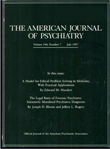Refugees' time perspective and mental health
Abstract
OBJECTIVE: The authors' goal was to investigate factors protective of the mental health of refugees, with a particular focus on time splitting and suppression of the past. METHOD: Structured interviews covering premigration and postmigration stresses, personal and social resources, and mental health were given to 1,348 Southeast Asian refugees resettled in Vancouver, British Columbia, and to a comparison sample of 319 residents of Vancouver. Both groups of subjects also performed a task designed to measure orientation toward past, present, and future. RESULTS: Compared with resident Canadians, refugees were more likely to exhibit an atomistic time perspective in which past, present, and future are split. Temporal atomism and avoidance of nostalgia were associated with a lower risk of depression than were other time perspectives. CONCLUSIONS: Under conditions of extreme adversity, time splitting and suppression of the past may be adaptive strategies, mitigating the risk of depression.



